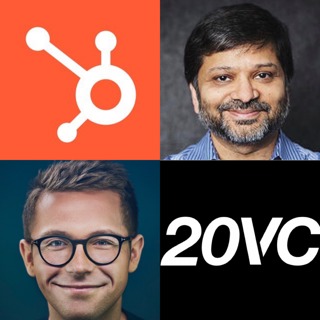
20VC: Hubspot Co-Founder Dharmesh Shah on The 3 Risks All Startups Face, Angel Investing Rules; No Founder Meetings and No Due Diligence, SMB vs Enterprise; Lessons on Pricing, Distribution and Why You Should Resist Going Enterprise
Dharmesh Shah is the Founder and CTO @ Hubspot, a full CRM platform with marketing, sales, service, and CMS software. Dharmesh started Hubspot in 2006 and today it is a publicly-traded company (NYSE: HUBS) with over 3,500+ people and a market capitalization of $16.9 billion. Prior to founding HubSpot, Dharmesh founded Pyramid Digital Solutions, which he bootstrapped with less than $10,000 and after 11 years of CEOship, Dharmesh helped the company get acquired in 2005 by SunGard Business Systems. In addition to co-authoring "Inbound Marketing" Dharmesh founded and writes for OnStartups.com -- a top-ranking startup blog and community with more than 1,000,000 members. Finally, if all of this was not enough, he is an angel investor in over 90 startups, including Coinbase, AngelList, Gusto, Okta and many more. and a frequent speaker on startups, growth, and the business of technology. In Today's Episode with Dharmesh Shah We Discuss: 1.) The Founding of Hubspot: How did Dharmesh's wife help Dharmesh find his co-founder in Brian? What about SMB did both Dharmesh and Brian find a shared passion for? What is the single biggest mistake Dharmesh made in the early days of Hubspot? 2.) The Culture Code: What is Dharmesh's single biggest advice to founders when it comes to culture? What does Dharmesh mean when he says "you have to treat culture like a product"? What does Dharmesh mean when he says he looks for a "low ego to accomplishment ratio"? How does he test for this when hiring new hires? How do the best people approach both responsibility and accountability? How does this show in their work and behaviour? 3.) The 3 Kinds of Risk in Startups: What does Dharmesh believe are the 3 core risks all startups face in the early days? How does Dharmesh advise founders when it comes to "testing for a market"? What is the right way to do customer discovery? What are the biggest mistakes founders make in the discovery process? How does Dharmesh advise founders on when to release their second product? What is the right framework for this decision? Where do so many founders make mistakes here? How does Dharmesh approach market timing risk? What have been his biggest lessons here? 4.) SMB vs Enterprise: Why does Dharmesh believe that SMB is the single best market for founders to choose? What are the single biggest challenges with enterprise? How do the long sales cycles and contracts in enterprise hide both customer satisfaction and prevent product development? What are some of Dharmesh's biggest lessons on pricing? Does Dharmesh agree you should always "raise your prices"? How does Dharmesh advise founders on when is the right time to go into enterprise from SMB? What are the single biggest changes founders need to know when making the move from SMB to enterprise? 5.) Angel Investing 101: What are Dharmesh's rules when it comes to angel investing? What have been some of Dharmesh's biggest lessons from analysing thousands of emails to founders pre-investing? What are the biggest signs in emails of future founder success? Why does Dharmesh not have calls with founders before investing? What are some of the biggest mistakes Dharmesh has made when angel investing? Items Mentioned in Today's Episode with Dharmesh Shah: The Hubspot Culture Code Dharmesh's Favourite Book: Les Miserables
13 Jun 20221h 4min
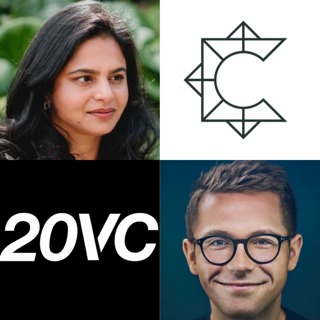
20VC: Why and How Traditional Venture Firms Need to Innovate, Building Spreadsheets To Figure Out Relationships to Money, Ego and Identity Management with Success and The Biggest Lessons from Working with Mark Zuckerberg in the Early FB Days with Ruchi Sa
Ruchi Sanghvi is a Founder and Partner @ South Park Commons Fund, a home for the most talented technologists, builders, and domain experts figuring out what's next. Prior to SPC, Ruchi was the first female executive at Dropbox and served as their Vice President of Operations. Prior to Dropbox, Ruchi was the first female engineer at Facebook, and was instrumental in implementing the first versions of key features like News Feed, Facebook Platform, Facebook Connect and Privacy. Ruchi has also served as a director on the board of Paytm, India's largest mobile payments platform. Prior to SPC, Ruchi was an active angel investor in 50+ companies including Gusto, Pinterest, Paytm, Brex, Figma, and Stemcentrx. In Today's Episode with Ruchi Sanghvi: 1.) From First Female Engineer To Community Leader and Fund Manager: How Ruchi made her way into the world of tech becoming the first female engineer at Facebook? What were her biggest lessons from her time at Facebook? What does Ruchi believe makes Mark Zuckerberg the special leader he is? How did Ruchi's time at Dropbox impact how she operates today? Does Ruchi agree with the Facebook motto, "move fast and break things"? 2.) Answering Life's Big Questions: Ego, Money, and Insecurity: What advice did Ruchi's father give her before he passed away that really impacted how Ruchi operates and acts in the world today? How does Ruchi assess her own relationship to money? How has it changed over time? How does she use a spreadsheet to measure her relationship to money? Having had such success so young, how does Ruchi approach ego management? When has Ruchi been arrogant in the past? How does she manage her ego today? What are Ruchi's biggest insecurities today? Why are they? 3.) Will DAOs Replace Venture Capital: How does Ruchi analyze the crypto fund landscape today? Where are the opportunities? Does Ruchi believe that large multi-stage firms can simply hire crypto partners and win in the new world of Web3 and crypto? How does Ruchi believe DAOs will disrupt the venture model today? Will DAOs displace institutional LP dollars from venture funds and be directed to DAOs? How are DAOs governed today? Who makes the decisions? How are tokens allocated? 4.) -1 to Zero: The Art of the Pick: What does Ruchi mean when she speaks of -1 to zero? What stage of company formation is this? What is the right framework by which founders should approach picking an idea to work on? How should a founder know when to give up and try a new idea? What are the most common mistakes founders make in this stage of idea picking?
10 Jun 202244min
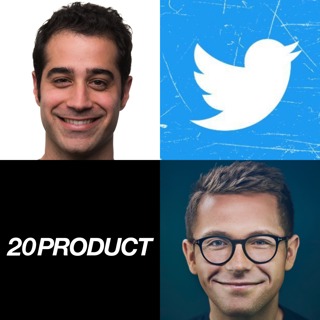
20 Product: Twitter's Former Head of Product, Kayvon Beykpour on How to Structure and Manage the Best Product Reviews, The Core Set of Questions to Ask All Potential Product Hires and When To Continue vs Quit on New Products
Kayvon Beykpour is one of the most prominent product leaders of the last decade. For the last 7 years, Kayvon has been at Twitter where he led all of the teams across Product, Engineering, Design, Research and Customer Service & Operations. Kayvon came to Twitter through Periscope, the live broadcasting app that raised from GV, Bessemer, Scott Belsky and was ultimately acquired by Twitter in 2015. If that was not enough, Kayvon is also an active angel investor today. In Today's Episode with Kayvon Beykpour You Will Learn: 1.) Entry into Product: How did Kayvon make his way into the world of tech and come to be Head of Consumer Product @ Twitter? What were some of Kayvon's biggest lessons from the journey with Periscope? What were some of Kayvon's biggest takeaways from working closely with Scott Belsky? 2.) Building Your Product Team: How does Kayvon advise on your first product hires? Should it be Head of Product or more junior product team members? When is the right time for the founder to hand off some core product decisions to these hires? What are the core traits and characteristics of some of the best first product hires? 3.) Perfecting the Hiring Process for Product Teams: How does Kayvon approach the hiring process for all new product team members? What are the stages? What does he look to learn at each stage? What questions reveal the most in product candidates? How do the best respond? How does Kayvon use case studies and product demos in the process? 4.) Building Product: 101: How does Kayvon approach product reviews? Who is invited? Who sets the agenda? How often? What have been Kayvon's biggest lessons about what leaders need to do to get the most from their product teams? How do they communicate? What has been one of Kayvon's biggest product mistakes? What did he learn? How does Kayvon advise founders on when to give up on a new product vs when to iterate and persist?
8 Jun 202243min
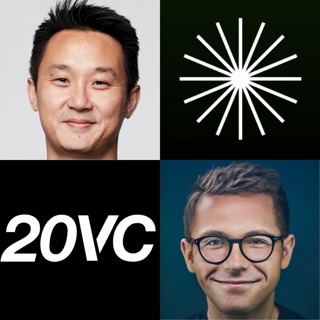
20VC: Why DAOs Will Replace Venture Capital, What Existing Incumbent Venture Firms Can Do To Survive, The Biggest Challenges Facing New DAOs Today and Whether Web3 Will Bring More or Less Income Inequality
Ian Lee is the Co-Founder of Syndicate, a web3 startup that has raised over $28M from a16z, Kleiner Perkins, IDEO, and 300+ investors. Previously, Ian was Managing Partner of IDEO CoLab Ventures, a crypto venture fund backed by IDEO focused on web3, crypto, and blockchain startups. From 2017-2021, Ian led investments and helped incubate 80+ crypto startups in the areas of DeFi, NFTs, DAOs, and more. From 2014-2017, Ian was the Head of Crypto at Citigroup and Citi Ventures globally. Listen to our prior episode on DAOs with Avichal Garg here. In Today's Episode with Ian Lee We Discuss: 1.) Ian's Entry into Tech and Crypto: Why did Ian decide early on that he did not like being a VC? What was it that changed his mind, showing him the impact investing can have? What have been the most significant but non-obvious developments in crypto? 2.) Why DAOs Will Replace Venture Capital: Why does Ian believe that DAOs will replace venture capital firms over time? How does Ian analyze the current landscape of Web3 investing and VC? Can existing firms layer on a Web3 Partner or Fund and win in the new Web3 landscape? How will the next generation of Web3 native firms be structured? 3.) DAOs 101: What really is a DAO? What is not a DAO? How are DAOs structured? How many people are invited? Who decides who is invited? How are decisions made within DAOs? How does this differ dependent on structure? What are the single biggest challenges that DAOs face today in operations? 4.) Crypto is The Future of the Internet: What does Ian mean when he says "crypto is the future of the internet"? What does this mean for the distribution of ownership and wealth in the next generation of the internet? Do DAOs and Web3 do more to harm or hurt income inequality today? What are the drivers that would lead Web3 to centralize wealth even further? Items Mentioned in Today's Episode with Ian Lee: Ian's Fave Book: The Innovator's Dilemma: The Revolutionary Book That Will Change the Way You Do Business Ian's Fave Web3 Resources: a16z's Crypto Canon, Jesse Walden's: The Ownership Economy 2022
6 Jun 202247min
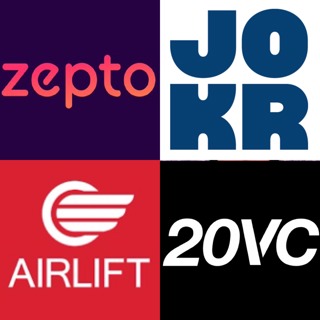
20VC: The Most Revealing Breakdown of Unit Economics for Quick Commerce; AOVs, Retention, Delivery Costs and more, Why The Business Model is Different for Emerging Markets & Will This Be a Market of Consolidation or Many Players
Over the last 10 days, we have seen unprecedented levels of layoffs from some of the biggest quick commerce providers in the world from Getir to GoPuff to Zapp and Gorillas. Today we dive into the world of quick commerce in emerging markets to uncover what is the same and what is different about the model in emerging markets. Usman Gul is the Founder & CEO @ Airlift, one of the fastest-growing quick commerce providers in the world with core operations in Pakistan. Airlift has raised over $100M in funding from First Round, Josh Buckley, Sam Altman, and 20VC. Ralf Wenzel is the Founder & CEO @ JOKR, a unique provider in the quick commerce market with their dual operations in both the US and LATAM. They are one of the only providers to operate in both emerging and developed economies. To date, JOKR has raised over $288M from Softbank, Balderton, GGV, and Kaszek to name a few. Aadit Palicha is the Founder & CEO @ Zepto, they have taken the Indian quick commerce market by storm since their early days in YC. To date, Aadit has raised over $360M with Zepto from YC, Lachy Groom, Breyer Capital, and Rocket Internet to name a few. In Today's Episode on Quick Commerce in Emerging Markets You Will Learn: 1.) Emerging Markets vs Developed Economies: Where is Quick Commerce Best? What are the single biggest benefits for quick commerce providers in emerging markets? What are the single biggest challenges of operating quick commerce companies in emerging markets as compared to developed economies? From a cost of goods and delivery perspective, what is the single biggest difference comparing operating in emerging markets? 2.) Warehouses, Picking and Delivery: The Economics Broken Down: What % of revenue does Zepto, Airlift and JOKR spend on average for new warehouses in mature markets? How does this change over time? How do they select warehouse locations? What % of revenue is picking costs for Zepto, Airlift and JOKR? What are some needle moving things that could reduce this picking cost? What % of revenue is delivery costs for Zepto, Airlift and JOKR? What levers can make this driver efficiency and delivery cost more efficient? What % of AOV does Airlift and Zepto charge for delivery? How does Zepto leverage power users to subsidise the delivery costs for newly acquired users? Why does JOKR not agree with charging delivery fees? How does charging delivery fees impact usage, frequency and AOV? 3.) Product Selection and Margins: Who Goods Have The Highest Margins? How do Zepto, Airlift and JOKR select the products they sell? How do the margins differ across different product categories? Why is fruit and vegetable the most important category for all three providers? What other metrics are heavily impacted by large spend on fruit and vegetable spend? 4.) AOV and Customer Spend: What is Good? What is the AOV for Airlift, JOKR and Zepto today? How do new markets compare to more mature markets? What are the drivers of the increase? Why does Zepto not believe that AOV is the right metric to be tracking? Why is gross profit per order the right metric to be tracking? 5.) Additional Business Models: Advertising: How much revenue does JOKR, Airlift and Zepto make from advertising revenue today? What can be done to increase this? How have JOKR been able to scale advertising revenue in such a short space of time? What has worked? What has not worked? How important is advertising revenue to the future sustainability of the business model?
1 Jun 202252min
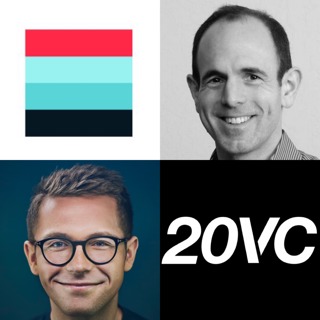
20VC: Keith Rabois on Why Buy Low, Sell High Does Not Work in Venture, Keith's Biggest Lessons from Prior Crashes, Why Today's Public Markets are not an Over-Reaction, Why Valuation is a Trap & Why Wokeness is a Function of Entitlement
Keith Rabois is a General Partner @ Founders Fund, one of the best performing funds of the last decade with a portfolio including Facebook, Airbnb, SpaceX, Stripe, Anduril, the list goes on. As for Keith, he has led the first institutional investments in DoorDash, Affirm and co-founded Opendoor. He has also led investments in Faire, Ramp, Trade Republic, and Stripe. As an operator, Keith has an unparalleled track record as a Senior Exec at Paypal, he then went on to influential roles at Linkedin and being COO at Square. Finally, as an angel, Keith made early investments into Airbnb, Lyft, Palantir, Wish and more. In Today's Episode with Keith Rabois: 1.) Buy Low, Sell High: What BS! Why does Keith believe that "buy low, sell high" does not work in venture? Why would it lead you to very dangerous investment decisions at the early stage? How does the size of your fund impact the appropriateness of "buy low, sell high"? 2.) The Current Landscape: Does Keith believe the current state of public markets is an over-reaction or a new normal? How does Keith respond to the suggestion that Founders Fund has paused new investments given the uncertainty in the market? How does Keith think about investing through cycles and temporal diversification? How does Keith advise young investors today questioning whether they are actually any good at this? What does Keith believe are his biggest fears and insecurities today? 3.) Outcome Scenario Planning and Competitor Analysis: Does Keith believe outcome scenario planning is important? Why does Keith believe you can always tell your biggest hits early? What have been the core signs for him? What have been some of Keith's biggest lessons from Mike Moritz and Vinod Khosla when it comes to upside maximization? What are the right questions to ask? Why does Keith believe you do need to look through public market comps when investing in startups? 4.) Time Allocation and Losing Faith in Founders: How does Keith approach time allocation across the portfolio? Spend time with the winners or help the struggling companies? What have been his biggest lessons here? What does Keith do when he has lost faith in the founder? How does he communicate it to them? What does Kieth believe VCs do wrong when they no longer believe in the founder or company? 5.) Do VCs Add Value? What does Keith believe is the acid test for whether he is doing his job as a VC properly? Why does Keith believe there are only 5 board members that add true value to their companies at scale? Who is the best board member Keith has ever worked with? Why? Why does Keith believe that age is not your friend as an investor? How does he combat this? 6.) The Downfall of SF and Wokeness: Will we see a reduction of wokeness in companies with the public markets correcting and power shifting from employees to employers? Is Keith concerned by the lack of coherence in the US today when it comes to politics? What are the core reasons for the downfall of SF to Keith? Why does he believe it is a net negative to build a company in SF today? Items Mentioned in Today's Episode: Keith's Most Recent Investment: Found
30 Mai 202239min

20VC: Scaling from a $4M Angel Fund to $900M, Why Seed May Be The Best priced Asset Class and Not Overpriced At All & The 3 Stages of Fund Scaling and What it Takes To Build a Firm with Aydin Senkut, Founder and Managing Partner @ Felicis
Aydin Senkut is the Founder and Managing Partner of Felicis. An original super angel turned multi-stage investor, he has been named on the Forbes Midas List for the past nine years (2014-2022). Felicis has been an incredible 16-year journey starting with a $4M Fund I back in 2006, their most recent fund in 2021 was $900M. Along the way, Felicis has invested in over 45 unicorns including Adyen, Canva, Shopify, Notion, Opendoor, and Plaid. Prior to starting Felicis, Aydin was a Senior Manager at Google where he spent an incredible 6 years. In Today's Episode with Aydin Senkut: 1.) The Founding of Felicis: How did Aydin transition from a successful angel to the first $41M institutional fund with Felicis? How did Aydin's mindset change moving from investing personal to LP capital? What does Aydin know now that he wishes he had known when he started Fund I? 2.) Fund Mechanics: Building a Portfolio Why does Aydin believe portfolios need to have 40-50 positions to be diversified enough? Given Aydin being multi-stage, how important is ownership on first check for Aydin and Felicis? Does Aydin believe it is possible to really concentrate capital into your best performers? How does Aydin think through outcome scenario planning? What is his biggest takeaway from this? 3.) Aydin Senkut: The Investor What have been the biggest changes in Aydin's style of investing over the last 16 years? What was Aydin's biggest miss? How did it impact his mindset moving forward? What is Aydin's biggest insecurity as an investor today? How has it changed? Where does Aydin still believe he is weak as an investor? What is he doing to combat it? 4.) The Venture Landscape: Why does Aydin believe that despite the pricing, seed is the best risk-adjusted asset class? How does Aydin evaluate where crossover funds will move with the death of many growth rounds? What segment of the market will be hit hardest by the crunch? What worries with this? What would Aydin most like to change about the venture landscape today? Why? Item's Mentioned In Today's Episode with Aydin Senkut Aydin's Favourite Book: The Black Swan: The Impact of the Highly Improbable
27 Mai 202243min
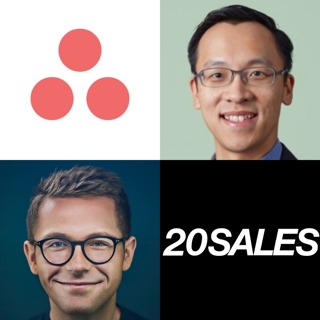
20 Sales: How To Create and Execute a World-Class Sales Playbook, Why You Should Do Both PLG and Enterprise Sales at the Same Time, Three Non-Obvious Qualities the Best Sales Reps Have & The Four Steps To Sales Team Onboarding with Oliver Jay, Former CRO
Oliver Jay (OJ) is one of the most successful sales leaders of the last decade. Most recently, OJ spent 6 years at Asana where he was hired as the company's first revenue leader. As CRO, OJ was responsible for product-led and sales-led revenue and grew the team from less than 20 to over 450. Before Asana, OJ spent 4 years at Dropbox in a period of hyper-scaling for the business where OJ was Head of APAC and LATAM. At Dropbox, OJ scaled the sales team from 0 to 50 while tripling ARR. If that was not enough, OJ is also an independent board member at Grab, the leading Super app in Southeast Asia. In Today's Episode with Oliver Jay You Will Learn: 1.) Entry into Sales: How did OJ make his way into sales with Dropbox? If OJ were to choose 1-2 lessons from his time at Dropbox and Asana that have stayed with him, what would they be? How did they impact his mindset? What were some of the non-obvious but crucial things Asana and Dropbox did in sales that led to success? 2.) The Playbook: Why does OG disagree with so many definitions of "the sales playbook"? What is the sales playbook to OJ? What are the different chapters? Should the founder be the one to create the sales playbook? What are the signs that the founder has a repeatable and scalable playbook? When is the right time to hire the first sales rep? Should it be a Head of Sales or Sales Rep? How does the first hire depend on whether you are PLG or enterprise sales led? 3.) The Hiring Process: How does OJ structure the hiring process? How does OJ know the qualities that he wants to uncover in each candidate? What questions does OJ ask to unpack whether the candidate has those qualities? How does this differ when hiring sales reps vs sales leaders? How does OJ use the sales demo to test the quality of a candidate? What does he want to see? Who does OJ bring into the interview process? When do they get involved? What are two questions that will immediately tell whether someone is a good manager? 4.) Sales Onboarding: How does OJ segment sales onboarding into 3 crucial steps? Chapter 1: Support: Why does OJ believe it is so important for reps to spend their first week with support? What should they look to learn? What questions should they be asking? Chapter 2: Market Knowledge: How can sales leaders teach and educate new reps on market landscape, dynamics and competition? Why does this have to come before sales training? Chapter 3: Sales Training: In the final step, what does the sales training process? What does OJ look for in the final sales demo? When does OJ let reps speak to customers? How does this differ when comparing enterprise to PLG?
25 Mai 202241min






















